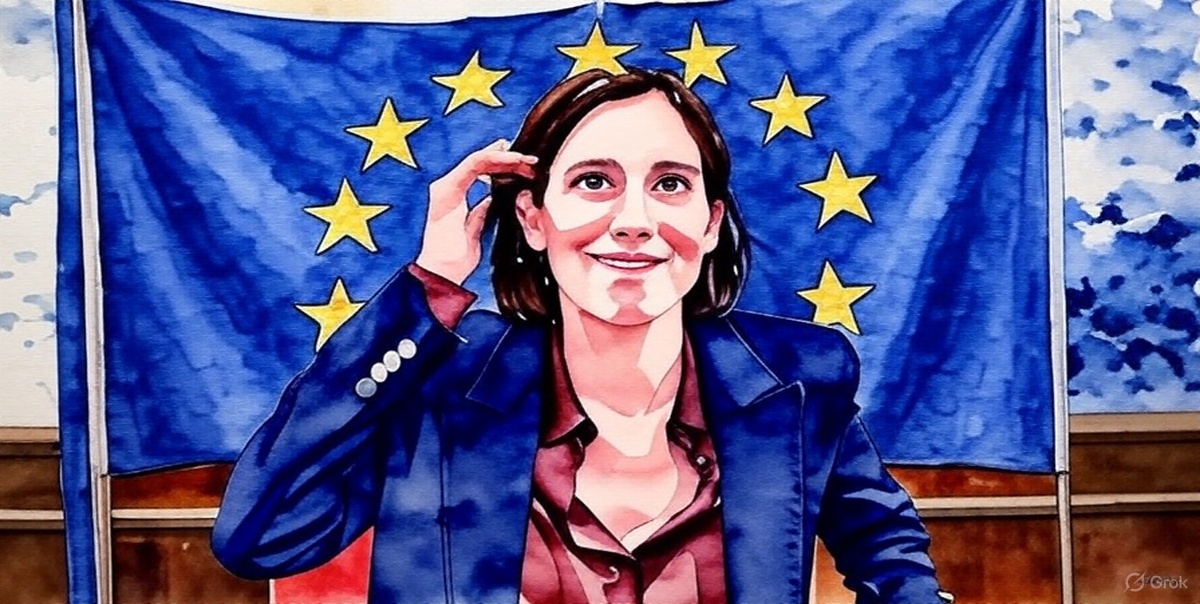Economy and business
From praise to fury: The Italian Left’s spectacular U-Turn on von der Leyen after US-EU tariff deal

The Italian political scene finds itself navigating a sea of reactions, sometimes conflicting and often charged with irony, following the recent tariff agreement between the United States and the European Union. At the heart of this debate, Prime Minister Giorgia Meloni’s position emerges with an approach that could be described as wait-and-see and pragmatically realistic.
Meloni has expressed a “positive judgment” on the agreement, highlighting that a potential trade escalation between Europe and the United States could have triggered “unpredictable and potentially devastating consequences”. For the Prime Minister, the 15% tariffs are “sustainable”, but she clarified that there is still much to “fight for” on the details, particularly to obtain exemptions for agricultural products. This emphasis on specific exemptions reveals a clear intention to safeguard national interests in crucial sectors, especially considering that the signed agreement is still “of a general nature” and “not legally binding”. Her deputy prime ministers, Matteo Salvini and Antonio Tajani, praised this prudence. Salvini seized the opportunity to suggest that Ursula von der Leyen cancel the Green Deal to favor Italian businesses, while Tajani proposed reducing the euro’s strength as an economic support measure.
A rather stark contrast is found with the Italian Left, and particularly with the Democratic Party (PD). For weeks, the predominant narrative in this camp was an almost dogmatic adoration of Ursula von der Leyen and the insistence that only the European Union had the legitimacy and capacity to negotiate with Donald Trump. Anna Ascani of the PD, for example, had dismissed Meloni’s meeting with Trump as “no results”, stating categorically that “it must not be Meloni to negotiate on tariffs, but the European Union”. The PD group leaders had even signed a joint statement, calling the Prime Minister’s attitude “disconcerting” and accusing her of appearing in Washington “hat in hand”. Elly Schlein reiterated the need for “rapid and strong” intervention by Europe, insisting on countermeasures also in the digital and financial services sectors. The Left, in short, pushed for a “hard line” against Trump, delegating all decision-making power to Brussels.
The result of such an approach, however, was deemed a “foregone failure” by many. Europe, appearing divided by divergent national interests (with France and Germany on different fronts, and Ireland concerned about tariffs on Big Tech), reached a “mediation that mediates absolutely nothing,” materializing in a 15% tariff. International reactions were swift, with the Russian vice-premier suggesting that Europeans “storm Brussels to hang all EU commissioners, including the crazy old witch Ursula”, and Hungarian Prime Minister Viktor Orbán ironically stating that Trump “ate the European Commission president for breakfast”. French Prime Minister François Bayrou called the day of the agreement a “dark day”. In essence, it was an “unconditional surrender”, which led to the “realization that the Europe so praised by the left as a political, economic, and military entity does not exist”. Without a Constitution or a government directly accountable to voters, the EU was labeled a “piece of junk”.

And this is where the irony of the situation fully manifests: the very same Left that had elevated Von der Leyen to a pedestal, now attacks her very harshly. The change of course is clear, with fierce criticisms such as the one reported under the headline “Ursula? Just drool from Von der Leyen”. Carlo Calenda, who until yesterday waved European flags, now attacks the Commission President, stating that she made the “schoolgirl figure” and should be “sent away”. The inevitable question is: “Where was he until yesterday, when he fully supported his dear “Ursuletta” in all her follies?”. The Left now complains that Von der Leyen is “not very transparent, arrogant”, and that she even “cheated with vaccines”, going so far as to accuse her of representing a Germany that “always used Italy only as a footstool”. The criticism extends to the fact that Europe “left out the agri-food sector that is so dear to us”, while French cognac seems to be safe. The leader of the Democratic Party, Elly Schlein, attacks von der Leyen, but it was the PD itself that sought the mediation of the Commission president, attacking Meloni, and voted strongly in favor during the recent vote of confidence in European Parliament.
Such a shift in position, from fervent Europeanism to harsh criticism, is a classic example of how reality often unmasks ideological narratives.
For Italy, the sectoral implications are significant. The agri-food sector, which boasts exports of 7.9 billion euros to the USA, is on high alert. The negative impact on wine is estimated at least 317 million euros, with the Brunello di Montalcino Consortium fearing a 40% loss in exports. The devaluation of the dollar is also a concern. There is, however, hope for zero tariffs for cheeses and extra virgin olive oil, and agricultural associations are requesting European compensation for the most affected supply chains. A subtle but no less important concern regards Mercosur. If Von der Leyen were to open the doors to this agreement, there could be an influx of 9 billion euros of Brazilian agri-food products at zero tariffs, without guarantees of reciprocity on quality standards. Paolo Gentiloni insists that Italy remove its veto on Mercosur, but such a prospect is considered “ambitious” and potentially “disastrous” for the Italian agri-food sector.
The fate of the pharmaceutical sector is also in limbo, pending an American investigation. Although the EU pushes for a maximum tariff of 15%, Trump had previously floated the idea of tariffs up to 200%. Italy, with pharmaceutical exports to the USA exceeding 10 billion euros, has a lot at stake, and some large European companies are already planning production investments in the United States to circumvent future tariffs. The agreement has also had repercussions on defense, perceived by many as the end of the dream of a common European defense. The United States, in fact, does not seem inclined to give Europe a free hand in the military field, and European defense company stocks recorded declines after the agreement was announced.
In this complex context, Giorgia Meloni’s position appears more anchored in reality, seeking to manage an imperfect agreement and salvage what is possible, while the Left, after exalting a fragile European ideal, now finds itself revealing its own contradictions with a post-hoc indignation. It is a classic example of how reality, unyielding, often transcends ideological narratives.






